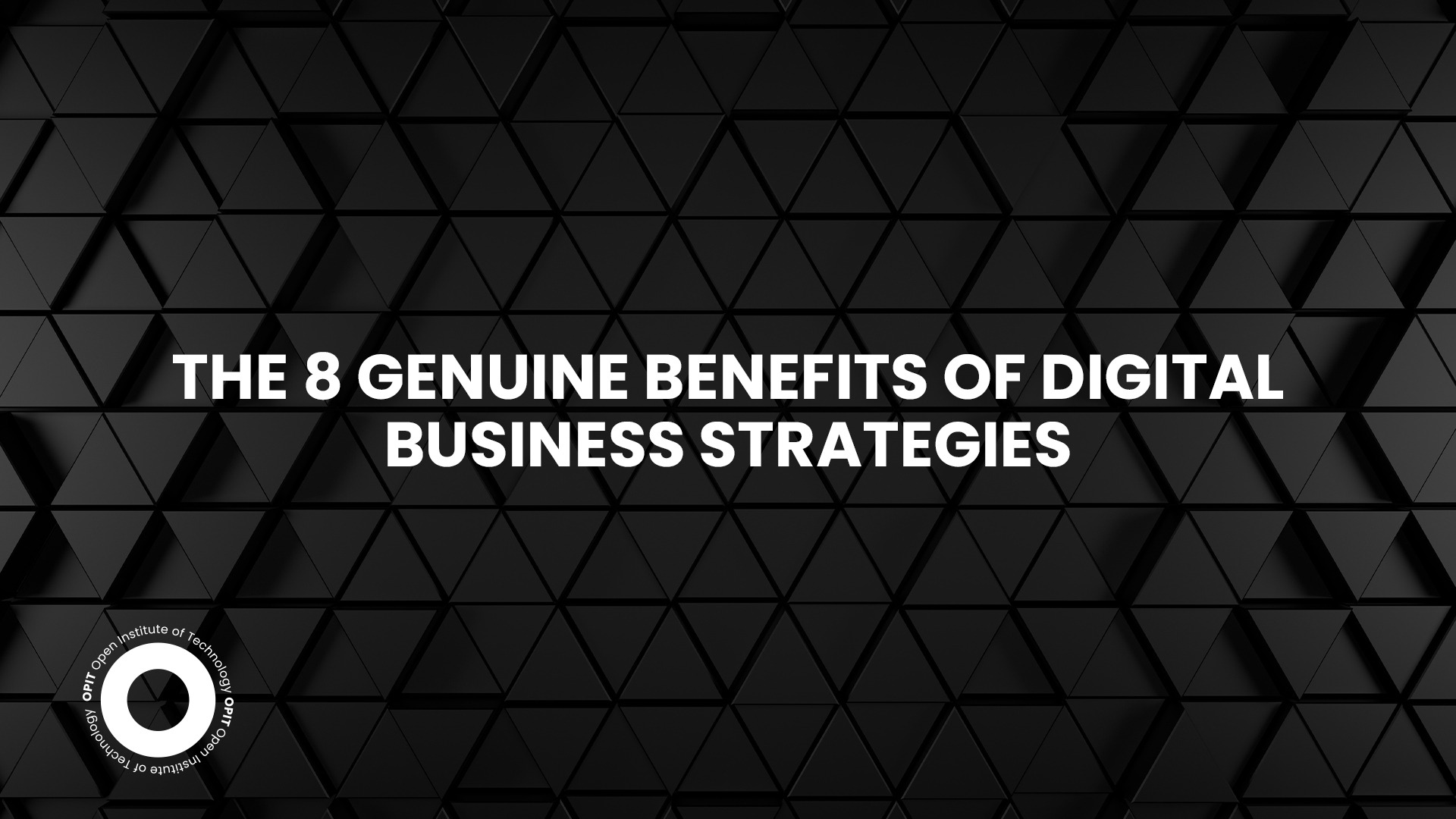

Before the COVID-19 pandemic, most businesses viewed digitalization as only an additional avenue for marketing their products or services. In the post-pandemic world though, digitalization has become the very lifeblood of survival for these businesses.
But implementing an efficient digital business strategy is no easy task. After all, a digital transformation calls for fundamentally reshaping how a business operates.
However, one look at what technology can do for you and your business is enough to make you understand that the complex digital transformation process is well worth it. If all of this is new to you, don’t worry. You can master all the necessary digital skills to reap the benefits of digitalization by completing the Open Institute of Technology’s Bachelor’s Degree in Digital Business. Alternatively, you can further your skills with the Institute’s Master’s Degree in Applied Digital Business.
Without further ado, let’s discuss eight genuine benefits of embracing digitalization and implementing digital business strategies.
1. Data-Driven Decision-Making
Efficiency. Innovation. Sustainable success. These desirable outcomes can only be reached with data-driven decision-making. While traditional decision-making mostly relies on experience, modern data-driven decision-making leverages the power of artificial intelligence (AI) to analyze vast amounts of data swiftly and accurately.
Of course, artificial intelligence brings much more to the corporate world beyond data analysis. This innovative technology can automate administrative tasks, provide instant customer responses, and enhance overall operational agility. All of these make managerial and business decisions and processes significantly faster.
That’s precisely why OPIT’s study programs feature courses dedicated to artificial intelligence in the business setting, from a general introduction to AI principles in the digital economy. The goal of these courses is simple – help you understand why, how, and when to use AI in business decision-making and beyond.
But as powerful as AI is, you can’t solely rely on technology in your decision-making process. AI is only there to help you make this process more comprehensive and strategized. This technology will also help you spend less time on mundane, control-based tasks, allowing you to focus on your judgment, critical thinking, and problem-solving.
Luckily, all of these skills are also covered by various Digital Business courses at OPIT, allowing you to become the best digital-era manager and decision-maker you can be.
2. Faster Time to Market
All the invaluable data gathered by artificial intelligence and other digital tools can also do wonders in the research and development department. With so much data at hand, businesses should have no trouble improving their existing products or services or launching new ones.
The latter process is especially important as the time it takes for a product to go from conceptualization to market availability can be rather lengthy. But what used to take months or years can now be done in weeks, days, or even hours, all thanks to digitalization.
Businesses can rely on modern technologies to rapidly test, pilot, iterate, and launch new products and services, significantly enhancing their agility in the ever-evolving business world. And hey, if a product or a service doesn’t quite work, you’ll be able to tell this almost immediately through online feedback and product reviews.
Using these valuable insights, businesses can revise their offerings to suit their customers’ preferences, needs, and interests. The result? Nothing but product excellence and customer satisfaction.
3. New Sales Channels
Dominating the business world is all about finding new ways to reach, engage, and retain customers. The good news? The digital-age business world offers seemingly endless opportunities to do this. You just need to know where to look.
Granted, your job doesn’t stop when a new channel is identified. Rather, it transforms. Now, it’s up to you to know how to use that channel effectively. To do so, you’ll need to learn about digital business models, as virtually every sales channel has a dedicated one.
Arguably, the most important thing to cover is how digital business models differ from traditional models (especially if you’ve only ever worked with the latter). And that’s precisely what OPIT’s “Digital Business Models” module covers.
You’ll learn just how vital online platforms, e-commerce, and digital marketing are in shaping modern business strategies. Use this knowledge to successfully tap into new markets and connect with a broader audience.
Naturally, there’s one online channel that’ll play critical role here – social media. Luckily for business owners and managers, most customers are active on at least one social media platform, essentially making the global population a prospect for sales.
4. Increased Market Share
For most businesses, the ultimate goal is to boost revenue, improve bargaining power, and strengthen competitive position. First step? Capturing a more substantial portion of the market. Fortunately, doing so is much easier now that most of the global population is within reach through digital business strategies.
So, it’s no wonder digital transformation has become essential to growing a brand. This process facilitates everything you need to establish a robust market presence – better financial performance, media activity, and advertising capabilities.
Best of all? You can use digital business strategies to only boost your market share or completely dominate your industry. It’s all up to you and how you harness the power of digitalization.
That’s why OPIT’s Applied Digital Business program contains a course titled “Maximizing Impact in the Digital Economy.” From gradual scaling to growth hacking, this course equips you with the insights and skills needed to ensure sustained success in virtually any industry.
5. Better Customer Interaction
Reaching and retaining new customers are equally important. But how can you do this? By ensuring most (if not all) of their interactions with the business are positive, of course. Naturally, digital transformation can help in this regard as well.
After all, the digital environment offers countless possibilities for improving the customer relationship with a brand. From streamlined online transactions to personalized communication through various digital channels, there’s virtually no area of the customer experience that digital transformation can’t positively impact. With this process, it’s all about simplicity, real-time services, and tailored experiences. And there’s hardly a customer that doesn’t love these things.
Granted, many (digital) elements are involved in achieving this desirable outcome, including artificial intelligence, automation, and digital marketing. But don’t worry; the OPIT’s programs extensively cover each element.
Take digital marketing as an example. Whether you’re interested in gaining an understanding of the key concepts of this dynamic field or delving into advanced strategies, there’s a module tailored to your needs.
6. Real-Time Transactions
As previously mentioned, customers love real-time services. In the past, this was hardly possible, as businesses were limited by time and infrastructure constraints. But not anymore. With digital tools, the 24/7 concept becomes a reality.
Customers can look at business offerings and make a purchase at any time of the day or night, breaking free from the traditional constraints of operating hours. All they need is a few clicks, and voilà – their transaction is complete.
This is made possible by innovative technologies like Blockchain, which dramatically enhances transaction speed while minimizing costs and any chances of fraud. Of course, this also means that this technology is covered by OPIT’s undergraduate program, which looks into the Blockchain’s transformative impact on business practices.
7. Easy Talent Acquisition
So far, this article has focused on how digital business strategies can benefit a brand’s relationship with customers. But these strategies can also revolutionize the process of talent acquisition. Of course, this is equally important, as there’s no successful business without a talented and capable workforce.
Before, recruiting top talent was often a challenging and time-consuming endeavor. Now, attracting talent (and the right talent for your business at that) is almost effortless. How?
Well, digital tools have got your back every step of the way. From job-matching sites like LinkedIn attracting candidates based on their professional profiles to automated systems streamlining the hiring process, digital tools have completely transformed talent acquisition.
That’s not to mention the endless opportunities working from home has opened up both for businesses and employees. Thanks to digitalization, the whole world is basically your talent pool.
8. Higher Revenue
Though each of the mentioned benefits is essential for business success in and of itself, they also have a cumulative impact on one of the most crucial business metrics: revenue. Investing in digitalization might seem like a major undertaking, but this impact makes every penny worth it.
Let’s recap what you can get with effective digital business strategies. You can get more effective systems and productive employees, better decision-making and judgment, improved products and sales channels, and a long-lasting (and interactive) relationship with customers. All of these create a robust foundation for revenue growth.
Reap the Full Benefits of Digital Business Strategies
There’s no doubt about it – effective digital business strategies can transform the trajectory of virtually any business. But for these strategies to work, they must be carried out with precision, knowledge, and strategic foresight.
That’s where OPIT’s Bachelor’s Degree in Digital Business and Master’s Degree in Applied Digital Business come into play.
Regardless of the digital business career you’re interested in (e.g., digital business consultant, digital marketing specialist, or digital transformation specialist), these courses will equip you with the necessary skills to stay ahead in a globally connected world.
Related posts

Computer Science is fast becoming one of the most valuable fields of study, with high levels of demand and high-salaried career opportunities for successful graduates. If you’re looking for a flexible and rewarding way to hone your computing skills as part of a supportive global community, the BSc in Computer Science at the Open Institute of Technology (OPIT) could be the perfect next step.
Introducing the OPIT BSc in Computer Science
The OPIT BSc in Computer Science is a bachelor’s degree program that provides students with a comprehensive level of both theoretical and practical knowledge of all core areas of computer science. That includes the likes of programming, databases, cloud computing, software development, and artificial intelligence.
Like other programs at OPIT, the Computer Science BSc is delivered exclusively online, with a mixture of recorded and live content for students to engage with. Participants will enjoy the instruction of world-leading lecturers and professors from various fields, including software engineers at major tech brands and esteemed researchers, and will have many paths open to them upon graduation.
Graduates may, for example, seek to push on with their educational journeys, progressing on to a specialized master’s degree at OPIT, like the MSc in Digital Business and Innovation or the MSc in Responsible Artificial Intelligence. Or they could enter the working world in roles like software engineer, data scientist, web developer, app developer, or cybersecurity consultant.
The bullets below outline the key characteristics of this particular course:
- Duration: Three years in total, spread across six terms.
- Content: Core courses for the first four terms, a student-selected specialization for the fifth term, and a capstone project in the final term.
- Focus: Developing detailed theoretical knowledge and practical skills across all core areas of modern computer science.
- Format: Entirely online, with a mixture of live lessons and asynchronous content you can access 24/7 to learn at your own pace.
- Assessment: Progressive assessments over the course of the program, along with a capstone project and dissertation, but no final exams.
What You’ll Learn
Students enrolled in the BSc in Computer Science course at OPIT will enjoy comprehensive instruction in the increasingly diverse sectors that fall under the umbrella of computer science today. That includes a close look at emerging technologies, like AI and machine learning, as well as introductions to the fundamental skills involved in designing and developing pieces of software.
The first four terms are the same for all students. These will include introductions to software engineering, computer security, and cloud computing infrastructure, as well as courses focusing on the core skills that computer scientists invariably need in their careers, like project management, quality assurance, and technical English.
For the fifth term, students will have a choice. They can select five electives from a pool of 27, or select one field to specialize in from a group of five. You may choose to specialize in all things cybersecurity, for example, and learn about emerging cyber threats. Or you could focus more on specific elements of computer science that appeal to your interests and passions, such as game development.
Who It’s For
The BSc in Computer Science program can suit a whole range of prospective applicants and should appeal to anyone with an interest or passion for computing and a desire to pursue a professional career in this field. Whether you’re seeking to enter the world of software development, user experience design, data science, or another related sector, this is the course to consider.
In addition, thanks to OPIT’s engaging, flexible, and exclusively online teaching and learning systems, this course can appeal to people from all over the globe, of different ages, and from different walks of life. It’s equally suitable for recent high school graduates with dreams of making their own apps to seasoned professionals looking to broaden their knowledge or transition to a different career.
The Value of the BSc in Computer Science Course at OPIT
Plenty of universities and higher education establishments around the world offer degrees in computer science, but OPIT’s program stands out for several distinctive reasons.
Firstly, as previously touched upon, all OPIT courses are delivered online. Students have a schedule of live lessons to attend, but can also access recorded content and digital learning resources as and when they choose. This offers an unparalleled level of freedom and flexibility compared to more conventional educational institutions, putting students in the driving seat and letting them learn at their own pace.
OPIT also aims not merely to impart knowledge through lectures and teaching, but to actually help students gain the practical skills they need to take the next logical steps in their education or career. In other words, studying at OPIT isn’t simply about memorizing facts and paragraphs of text; it’s about learning how to apply the knowledge you gain in real-world settings.
OPIT students also enjoy the unique benefits of a global community of like-minded students and world-leading professors. Here, distance is no barrier, and while students and teachers may come from completely different corners of the globe, all are made to feel welcome and heard. Students can reach out to their lecturers when they feel the need for guidance, answers, and advice.
Other benefits of studying with OPIT include:
- Networking opportunities and events, like career fairs, where you can meet and speak with representatives from some of the world’s biggest tech brands
- Consistent support systems from start to finish of your educational journey in the form of mentorships and more
- Helpful tools to expedite your education, like the OPIT AI Copilot, which provides personalized study support
Entry Requirements and Fees
To enroll in the OPIT BSc in Computer Science and take your next steps towards a thrilling and fulfilling career in this field, you’ll need to meet some simple criteria. Unlike other educational institutions, which can impose strict and seemingly unattainable requirements on their applicants, OPIT aims to make tech education more accessible. As a result, aspiring students will require:
- A higher secondary school leaving certificate at EQF Level 4, or equivalent
- B2-level English proficiency, or higher
Naturally, applicants should also have a passion for computer science and a willingness to study, learn, and make the most of the resources, community, and support systems provided by the institute.
In addition, if you happen to have relevant work experience or educational achievements, you may be able to use these to skip certain modules or even entire terms and obtain your degree sooner. OPIT offers a comprehensive credit transfer program, which you can learn more about during the application process.
Regarding fees, OPIT also stands out from the crowd compared to conventional educational institutions, offering affordable rates to make higher tech education more accessible. There are early bird discounts, scholarship opportunities, and even the option to pay either on a term-by-term basis or a one-off up-front fee.

The Open Institute of Technology (OPIT) provides a curated collection of courses for students at every stage of their learning journey, including those who are just starting. For aspiring tech leaders and those who don’t quite feel ready to dive directly into a bachelor’s degree, there’s the OPIT Foundation Program. It’s the perfect starting point to gain core skills, boost confidence, and build a solid base for success.
Introducing the OPIT Foundation Year Program
As the name implies, OPIT’s Foundation Program is about foundation-level knowledge and skills. It’s the only pre-bachelor program in the OPIT lineup, and successful students on this 60-ECTS credit course will obtain a Pre-Tertiary Certificate in Information Technology upon its completion. From there, they can move on to higher levels of learning, like a Bachelor’s in Digital Business or Modern Computer Science.
In other words, the Foundation Program provides a gentle welcome into the world of higher technological education, while also serving as a springboard to help students achieve their long-term goals. By mixing both guided learning and independent study, it also prepares students for the EQF Level 4 experiences and challenges they’ll face once they enroll in a bachelor’s program in IT or a related field.
Here’s a quick breakdown of what the OPIT Foundation Program course involves:
- Duration: Six months, split into two terms, with each term lasting 13 weeks
- Content: Three courses per term, with each one worth 10 ECTS credits, for a total of 60
- Focus: Core skills, like mathematics, English, and introductory-level computing
- Format: Video lectures, independent learning, live sessions, and digital resources (e-books, etc.)
- Assessment: Two to three assessments over the course of the program
What You’ll Learn
The OPIT Foundation Program doesn’t intensely focus on any one particular topic, nor does it thrust onto you the more advanced, complicated aspects of technological education you would find in a bachelor’s or master’s program. Instead, it largely keeps things simple, focusing on the basic building blocks of knowledge and core skills so that students feel comfortable taking the next steps in their studies.
It includes the following courses, spread out across two terms:
- Academic Skills
- Mathematics Literacy I
- Mathematics Literacy II
- Internet and Digital Technology
- Academic Reading, Writing, and Communication
- Introduction to Computer Hardware and Software
Encompassing foundational-level lessons in digital business, computer science, and computer literacy, the Foundation Program produces graduates with a commanding knowledge of common operating systems. Exploring reading and writing, it also helps students master the art of communicating their ideas and responses in clear, academic English.
Who It’s For
The Foundation Year program is for people who are eager to enter the world of technology and eventually pursue a bachelor’s or higher level of education in this field, but feel they need more preparation. It’s for the people who want to work on their core skills and knowledge before progressing to more advanced topics, so that they don’t feel lost or left behind later on.
It can appeal to anyone with a high school-level education and ambitions of pushing themselves further, and to anyone who wants to work in fields like computer science, digital business, and artificial intelligence (AI). You don’t need extensive experience or qualifications to get started (more on that below); just a passion for tech and the motivation to learn.
The Value of the Foundation Program
With technology playing an increasingly integral role in the world today, millions of students want to develop their tech knowledge and skills. The problem is that technology-oriented degree courses can sometimes feel a little too complex or even inaccessible, especially for those who may not have had the most conventional educational journeys in the past.
While so many colleges and universities around the world simply expect students to show up with the relevant skills and knowledge to dive right into degree programs, OPIT understands that some students need a helping hand. That’s where the Foundation Program comes in – it’s the kind of course you won’t find at a typical university, aimed at bridging the gap between high school and higher education.
By progressing through the Foundation Program, students gain not just knowledge, but confidence. The entire course is aimed at eliminating uncertainty and unease. It imbues students with the skills and understanding they need to push onward, to believe in themselves, and to get more value from wherever their education takes them next.
On its own, this course won’t necessarily provide the qualifications you need to move straight into the job market, but it’s a vital stepping stone towards a degree. It also provides numerous other advantages that are unique to the OPIT community:
- Online Learning: Enjoy the benefits of being able to learn at your own pace, from the comfort of home, without the costs and inconveniences associated with relocation, commuting, and so on.
- Strong Support System: OPIT professors regularly check in with students and are on hand around the clock to answer queries and provide guidance.
- Academic Leaders: The OPIT faculty is made up of some of the world’s sharpest minds, including tech company heads, experienced researchers, and even former education ministers.
Entry Requirements and Fees
Unlike OPIT’s other, more advanced courses, the Foundation Program is aimed at beginners, so it does not have particularly strict or complex entry requirements. It’s designed to be as accessible as possible, so that almost anyone can acquire the skills they need to pursue education and a career in technology. The main thing you’ll need is a desire to learn and improve your skills, but applicants should also possess:
- English proficiency at level B2 or higher
- A Secondary School Leaving Certificate, or equivalent
Regarding the fees, OPIT strives to lower the financial barrier of education that can be such a deterrent in conventional education around the world. The institute’s tuition fees are fairly and competitively priced, all-inclusive (without any hidden charges to worry about), and accessible for those working with different budgets.
Given that all resources and instruction are provided online, you can also save a lot of money on relocation and living costs when you study with OPIT. In addition, applicants have the option to pay either up front, with a 10% discount on the total, or on a per-term basis, allowing you to stretch the cost out over a longer period to ease the financial burden.
Have questions?
Visit our FAQ page or get in touch with us!
Write us at +39 335 576 0263
Get in touch at hello@opit.com
Talk to one of our Study Advisors
We are international
We can speak in:


